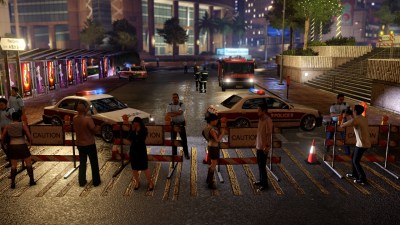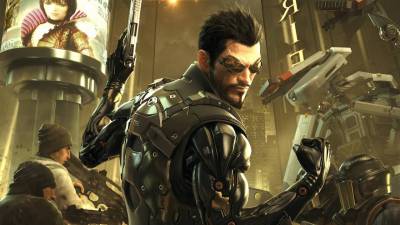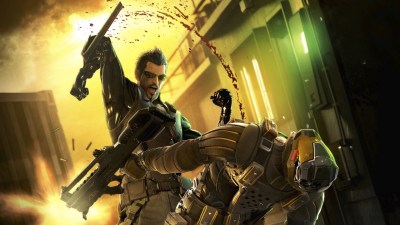Sleeping Dogs is notable for being a game which almost never existed. Originally designed as part of Activision’s True Crime series, its cancellation by the publisher left its fate in limbo, until Square Enix stepped forward and rescued it from damnation. With a little tweaking, it re-emerged as an original IP and was finally released in 2012. It’s safe to say that few expected much from the title, but the game has since become something of a cult hit - with its success leading to last year’s announcement that a sequel is on the way.
The game’s premise isn’t particularly original: Triad gangs took Hong Kong police officer Wei Shen’s sister from him, addicting her to drugs and spiraling her on a self-destructive path that ultimately lead to her death. Just as his sister lost everything, Wei Shen has willfully given up everything to take the Triads down once and for all in his capacity as an undercover agent. It’s a tried-and-true story of a cop out for revenge, but it’s engaging enough and there are some interesting twists and turns before the final credits roll.
 When Sleeping Dogs begins, Shen’s already deep undercover - embedded in a low-level position with the Sun On Yee , a thinly-veiled and amusing reference to the Sun Yee On, a real-life Triad gang in Hong Kong. While the setting adds plenty of local flavor to Sleeping Dogs, Shen’s narrative arc is relatable to anyone the least bit familiar with the archetypal story of an undercover cop; he quickly gains a reputation within the Sun On Yee, getting close to its members - such as the steroid-addled, permanently scowling Winston Chu, or the cowardly childhood best friend Johnny Ma - while embracing their uncouth lifestyle to the point where he questions his original loyalties and intentions.
When Sleeping Dogs begins, Shen’s already deep undercover - embedded in a low-level position with the Sun On Yee , a thinly-veiled and amusing reference to the Sun Yee On, a real-life Triad gang in Hong Kong. While the setting adds plenty of local flavor to Sleeping Dogs, Shen’s narrative arc is relatable to anyone the least bit familiar with the archetypal story of an undercover cop; he quickly gains a reputation within the Sun On Yee, getting close to its members - such as the steroid-addled, permanently scowling Winston Chu, or the cowardly childhood best friend Johnny Ma - while embracing their uncouth lifestyle to the point where he questions his original loyalties and intentions.
But its not narrative that is the main focus of Sleeping Dogs, which in terms of open-world Grand Theft Auto-style games, must be viewed in a pre-Grand Theft Auto V context; rather the characters that surround Shen and the flavorful city of Hong Kong is what makes the game special.
Given that firearms are very much illegal in Hong Kong, Shen has no firearms for much of the game and must rely mostly on martial arts - or the occasional tire iron or sharpened object littered amongst the environment - to bring the smackdown to his enemies.
The combat system works much like Batman: Arkham Asylum’s style of combat, but plays a little more fluidly and a little less cinematically, which works for a game as visceral as Sleeping Dogs. Instead of Batman’s increasingly powerful set of gadgets, Shen has to rely on his fists of fury to take him to live another day, and an expanding moveset allows him to take on more varied, numerous and better trained enemies - with different moves tailored to different enemy types such as quick, grapple or heavy styles. In that regard, the combat system allows for much more tactics, and fights are quite difficult, although the setting of almost every fight is littered with environmental hazards, that are innocuous as throwing a guy into a dumpster to as extreme and brutal as throwing a guy face first into a circular buzz saw.
It’s not until about five hours in when the guns start to show up, and this makes a great deal of sense from a narrative standpoint. Guns can’t be bought, but must be given - or obtained (forcefully) from rival gang members. Shen’s access to guns coincides with his rise in prominence on the Sun On Yee criminal underground scene, so this tends to make quite a bit of sense: Shen would have much less opportunity to wield a firearm, even as an undercover cop, than any of the protagonists of the Grand Theft Auto franchise.
Like any good John Woo movie, the gunplay is loose and imprecise, but the way in which Sleeping Dogs allows for bullet time in moments where Shen leaps from cover piece to cover piece lends it some great flair. But it’s never as challenging or rewarding as the unarmed hand-to-hand component of combat. There are echoes of Stranglehold present in the interactive nature of environments, but Sleeping Dogs is far more restrained. You won’t be diving across a room onto a trolley before sliding down a bannister, but you can utilize the objects in your environment to inflict some rather gruesome deaths.
Another aspect of Sleeping Dogs that doesn’t quite work as well as it wants to, or is only superficially interesting, is Shen’s love interest - or rather various love interests. Rather than stick to one or possibly two women, the game integrates the ‘dating’ aspect of the game into the main plot and has four different women vying for Shen’s affections, although each only makes at most two appearances. After being seduced by Shen and ultimately tossed aside in the narrative, each provides an upgrade to the mini-map, which just seems like an odd way to treat overall solid characters who are voiced admirably by the likes of Lucy Liu, Emma Stone and other comparable voice actors. The result is that the game’s treatment of women feels disposable and while never feeling overtly sexist, the lack of attention given to the female cast is a little disappointing.
Speaking of the voice cast, United Front Games spared no expense, adding the likes of Tom Wilkinson, Yunjin Kim and Will Yun Lee along with Stone and Liu to the mix. Graphically, the game is more than serviceable, although it looks  significantly better on PC than on its console counterparts. The soundtrack, composed by Nathan Wang, features a variety of ambient music and radio hits, from Funk/Soul legend Charles Bradley to original compositions from Nathan Wang such as ‘The Hard Way.’ These easily fit right in with one another, and seamlessly blend to give Hong Kong a real multicultural feel. You can even perform Karaoke in a series of minigames.
significantly better on PC than on its console counterparts. The soundtrack, composed by Nathan Wang, features a variety of ambient music and radio hits, from Funk/Soul legend Charles Bradley to original compositions from Nathan Wang such as ‘The Hard Way.’ These easily fit right in with one another, and seamlessly blend to give Hong Kong a real multicultural feel. You can even perform Karaoke in a series of minigames.
From a writing standpoint, the overall quality of the character interactions is high if you remove the dating elements. The aforementioned Winston Chu is one of the more likeable characters, and along with his psychotic mother - who wields a meat cleaver with wanton abandon - serves to show just how crazy and desperate the Sun On Yee are. Johnny Ma, Shen’s childhood friend and connection into the gangster lifestyle, also serves as a well-played foil to Shen, the hero to the coward. Their roles reverse in subtle but noticeable ways throughout the narrative, as Johnny Ma proves himself to be more self-sacrificing than self-interested. To round it all out is Dogeyes Lin, Winston Chu’s rival and the man that was responsible for Shen’s sister’s untimely demise, and Uncle Po and Broken Nose Jiang, model gang leaders that rival the best that Grand Theft Auto has to offer - all in a cultural Chinese context.
Sleeping Dogs has all the elements that make a Grand Theft Auto-style open-world game great. There are hundreds of collectibles and outfits to find and purchase, and a vibrant and colorful city that very much plays into the Chinese culture and aesthetic. While its narrative thrust is not the strongest and its navigation controls sometimes a bit convoluted, Shen is a likable enough character, and the supporting cast is enjoyable enough to keep things flowing quite nicely. Ultimately though, what separates Sleeping Dogs from something like Grand Theft Auto V is the seriousness with which it is designed; rather than use caricature and satirical radio show hosts to carry it through, Sleeping Dogs remains fully committed to its cultural grounding in Hong Kong and never undermines Shen’s mission, although the occasional goofy moments such as Shen’s awful rendition of various karaoke hits seem to make it feel wholly realistic rather than jarring.
While Sleeping Dogs has its issues, they’re not the kind you’ll obsess over, or even spend much time thinking about in-game when you’re beating up dozens of thugs or careening around Hong Kong on a motorcycle during the game’s 25 hour run time. Presentation is key, and Sleeping Dogs seems to fundamentally understand that, resulting in a game that is one of the rough diamonds of the last generation.



